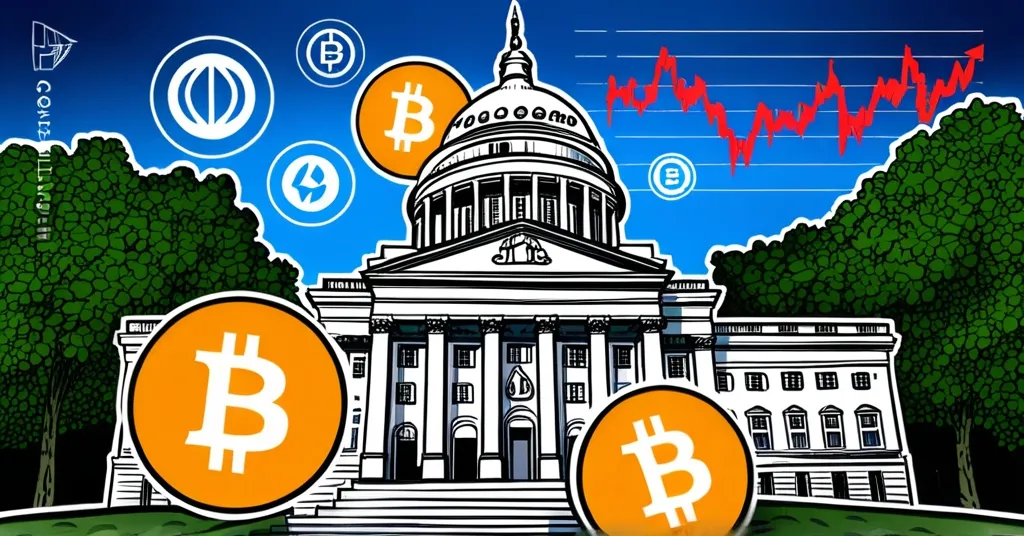U.S. Senate Forms Crypto Subcommittee: Lummis Leads, Trump’s Bitcoin Push Impacts Market

Senate Banking Committee Launches First-Ever Crypto Subcommittee, Led by Bitcoin Advocate Sen. Lummis
- U.S. forms new subcommittees on digital assets
- Senator Cynthia Lummis to lead Senate’s crypto-focused group
- President Trump’s Bitcoin support influences market
The U.S. government is intensifying its engagement with the cryptocurrency sector by establishing new subcommittees focused on digital assets. Digital assets are anything of value that exists in digital form, including cryptocurrencies like Bitcoin. Financial technology, or fintech, encompasses the use of technology to enhance financial services, while artificial intelligence (AI) involves the simulation of human intelligence by computer systems. Leading these efforts are key figures such as Congressman Bryan Steil, Senator Tim Scott, and Bitcoin advocate Senator Cynthia Lummis.
New Subcommittees Formed
Congressman Bryan Steil has been appointed as the chairman of the Financial Services Subcommittee on Digital Assets, Financial Technology, and Artificial Intelligence. This appointment underscores the government’s commitment to exploring and regulating the digital economy, with a focus on fostering innovation. Steil’s role will be pivotal in shaping the regulatory framework for these cutting-edge technologies.
Simultaneously, Senator Tim Scott is set to spearhead the Senate’s first subcommittee dedicated solely to cryptocurrencies. This historic move marks the first time the Senate has established a group specifically to address this rapidly growing field. Senator Cynthia Lummis, a vocal Bitcoin advocate, is poised to lead this subcommittee, pending a final vote. Her involvement signifies a strong push towards integrating digital assets into the national economy.
Key Figures in Crypto Policy
Congressman Andy Barr has been reappointed as Chairman of the Financial Institutions Subcommittee, where he will continue to oversee financial regulators. With these leaders at the helm, the U.S. aims to assert its position as a global leader in the digital asset space, a significant shift from the minimal government interest just two years ago.
Senator Lummis, often dubbed a Bitcoin maximalist, has consistently championed decentralized currencies. Her appointment suggests a potential pro-crypto stance within the Senate, which could lead to more favorable regulations for Bitcoin and other cryptocurrencies. Lummis’s advocacy aligns with broader legislative efforts like the Financial Innovation and Technology for the 21st Century Act (FIT21) and the Boosting Innovation, Technology and Competitiveness Through Optimized Investment Nationwide (BITCOIN) Act, both aimed at providing regulatory clarity and fostering innovation.
Trump’s Influence on the Crypto Market
President Trump’s vocal support for Bitcoin has added a new dimension to the market. He has proposed the creation of a national Bitcoin reserve, a government-held stockpile akin to gold reserves, which has been backed by states like Texas and Ohio. This proposal could significantly influence Bitcoin’s integration into the U.S. economy, reflecting a broader push to keep the U.S. competitive in the global digital asset space.
Trump’s endorsement has already led to significant market reactions, with Bitcoin prices surpassing $100,000. This surge is partly driven by broader economic concerns, such as warnings of a looming U.S. dollar crisis. His statements reflect a desire to position the U.S. ahead of countries like China, which are also exploring cryptocurrency reserves.
Public Opinion and Future Implications
Public opinion on integrating digital assets into the economy remains divided. Some see it as a necessary step to maintain U.S. competitiveness in the global market, while others are concerned about the volatility and specific proposals like a Bitcoin reserve. This reflects a classic debate between optimism and caution surrounding digital assets.
The establishment of these subcommittees is a critical step towards providing the regulatory clarity that has been lacking in the cryptocurrency industry. It’s a delicate balance of fostering innovation while protecting consumers, a challenge these new leaders must navigate. With the world watching, the U.S. is stepping up to lead the charge in the digital economy.
But let’s not forget the humor in all of this. Imagine a world where Bitcoin is as common as the dollar, and you’re buying your morning coffee with Satoshis (named after Bitcoin’s mysterious creator, Satoshi Nakamoto). It’s a future that’s both thrilling and a bit terrifying, isn’t it?
Key Takeaways and Questions
- What steps is the U.S. government taking regarding cryptocurrency and financial technology?
The U.S. is establishing new subcommittees focused on digital assets, with leaders like Congressman Bryan Steil and Senators Tim Scott and Cynthia Lummis appointed to key roles.
- Who are the key figures leading the U.S.’s crypto policy efforts?
Key figures include Congressman Bryan Steil, Senator Tim Scott, Senator Cynthia Lummis, and Congressman Andy Barr, with President Trump also influencing policy with his support for Bitcoin.
- What is the significance of the Senate’s first crypto-focused subcommittee?
It marks a pivotal moment in U.S. policy, indicating a serious commitment to regulating and integrating cryptocurrencies into the national economy, aiming to lead the global digital asset space.
- How does the public view the integration of digital assets into the economy?
Public opinion is divided; some view it as a necessary step to foster innovation, while others are concerned about market volatility and specific proposals like a Bitcoin reserve.
- What role does President Trump play in the crypto market?
President Trump’s support for Bitcoin, including his proposal for a national Bitcoin reserve, is influencing market dynamics and pushing forward crypto integration in the U.S.



